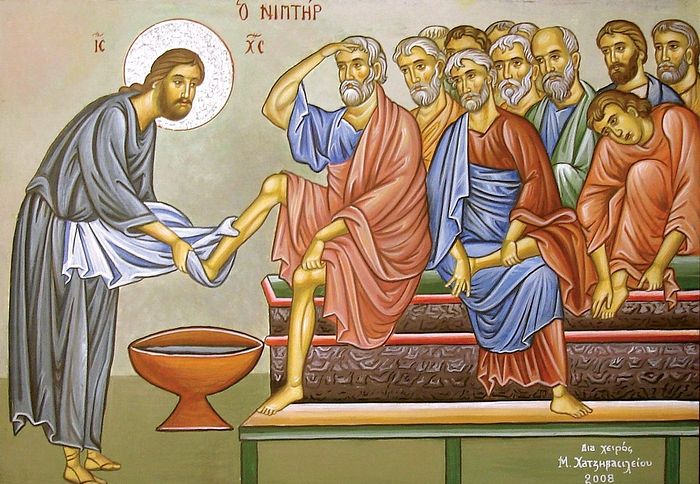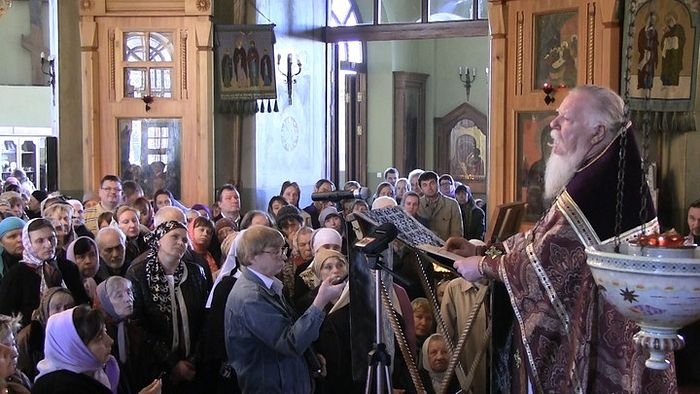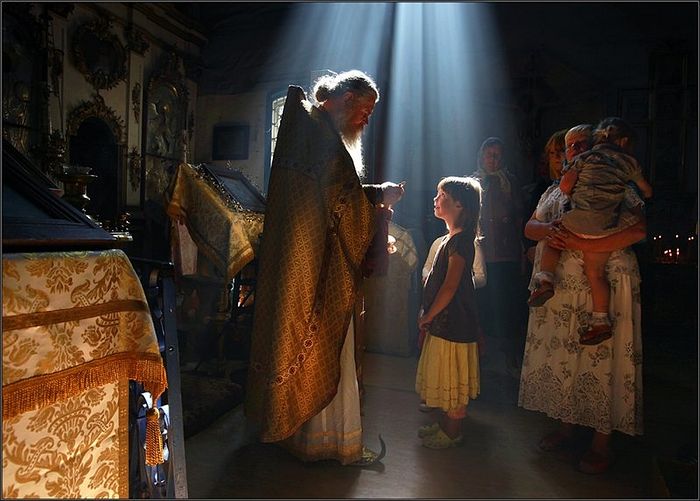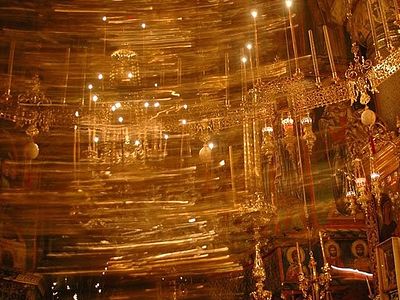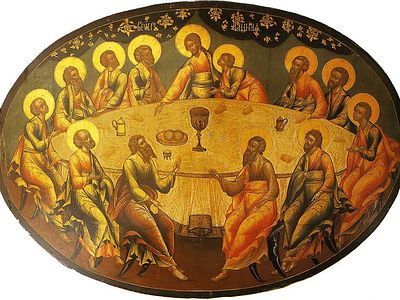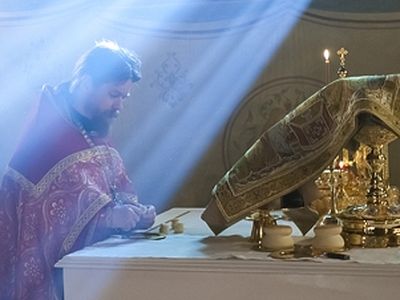Holy Week is a special period in the Church year, when the Church gives us the possibility through the Divine services to participate in the final days of Christ the Savior’s life, that His life and that which He accomplished for fallen mankind would appear before our thoughts and prayerful gaze. A special place is given to Holy Thursday within Holy Week. It is impossible and unnecessary to talk about the special importance of this or that day, but nevertheless, every day has its special color and its importance. Wherein is the greatness of this day, Great and Holy Thursday, as we call it? In that something happened that overturned the entire civilized world, and that without any economic, political, militaristic, or any other kind of transformation, the world changed. Of course, not immediately. This change occurred over the centuries, and even now it’s influence is felt and implemented. Although we could just be at home today, doing our own thing, or just relaxing without any obligations, or just sleeping (if you have such a chance), we gather here. Our degrees of understanding what happened two thousand years ago are, of course, different. And in this difference, we all, of course, will die. One of us, perhaps, will penetrate into the deepest depths of what happened, while for another it remains only the desire of the soul, which the mind is unable to embrace—you can see this quite often. But there is this human desire to come today, and participate in that which happened two thousand years ago.
We priests fulfill several roles in the Church, and one of the most important roles is that of teacher. Therefore, we are obliged by our priestly position to explain what in general is happening here for people. It is important, because Christianity is called mental work. That which happens with a man in the Church, at first happens in his mind. A man must receive with his mind, and then according to the measure of his comprehension he begins to receive it with his heart and begins to love it. Before you go to death, of which the Lord knew before His birth in Bethlehem, it inevitably must occur. And this inevitability is natural.
People come to know some patterns in their lives by experience, although it is always a surprising thing for a person. For example—the betrayal of Judas. Nearly every day someone comes saying he has grief in his heart, and this grief comes from having betrayed someone. And every time, I have to explain again that there is a pattern in this. A man, especially good, and conscientious, and open, and honest, and who wants good, is, as a rule, betrayed. This is a rule; it is a pattern. Why this is happening can be deciphered, or maybe not, but it is in and of itself interesting. It can be no other way. It doesn’t happen that we went to the metro, get inside, and someone else comes at the next stop, and suddenly betrays us. It’s not possible. Children can betray. A husband can betray. A wife can betray. Parents can betray. Friends can betray. A boss at work can betray. And vice versa: students—their teacher.
Sometimes betrayals are not even so profitable, because you don’t always get thirty pieces of silver, like Judas. And sometimes someone just betrays another, getting nothing in return, whether from fear or from some uncomfortable situation. Only very close people betray one another. Therefore, Christ was betrayed by someone very close—the apostle Judas, one of the closest disciples. Therefore, there’s nothing surprising in this. You can even write all of human history as the history of betrayals. Every period, and the history of every family, and of the relationship of any two people, as a rule, is faced with betrayal. Therefore, even in social-psychological terms, Christ could not but be betrayed, for the appearance of such a Man against the general background of such spiritual abominations in which people abide, and the appearance of such purity as the Son of God had, cannot go without reaction.
The holy fathers of the Church long ago noted that Christ was crucified out of envy. Envy is not only for some nice car, or for some beautiful wife, or for a position in society, or for talent. The most terrible envy—satanic—is the envy of spiritual beauty. As we have spoken about many times, Christ was not only the most noble Man on earth, coming from a royal line, but He is the Son of God. There is no higher nobility on Earth. We are also sons of God to some degree, but by grace, while He, directly conceived in the body of the Virgin Mary by the Holy Spirit, is a completely unique Person.
All those around, who could not compare with Him in His nobility, understandably hated Him. Day and night they dreamed of killing him, because even His mere presence in the world caused them discomfort. They were not doing alright, because He exists, because His presence and His life in and of itself, even when He didn’t say anything about them, revealed them, because anyone could compare Him with them. They were intelligent people, very well-read, highly educated, and could pass judgment on anything; they were not ordinary people, but, on the contrary, were the most elite of society, politically, and so to speak, “autocratically.” And the fact that He was this way infuriated them. And when something infuriates you, at least you can moan about it, tell everyone about it, complain, slander, and pull some dirty tricks; and if there is a chance, you can even kill. For this, the best method is that which the Pharisees chose: to push the power of the state on Him. For the government to fulfill this desire, you have to make it so they fear not fulfilling it, and so it’s all skillfully implemented, as would happen later with other people. It’s all quite inevitable.
It’s no trouble at all to gear up a crowd today. Today—“Hooray!”, tomorrow—“Away with Him!”; today—“Hosannah,” two days from now—“Crucify Him!” The same people said all this. It’s very easy, because when some emotions are at work within someone, and they can be manipulated by them, then it will happen. As for the head, the mind is absent here. Public voting rights are based on this. In any country, the majority of the people, the absolute majority (more than 90%), are principally incapable of reasoning. So you take someone, show him all the time on TV, say the same thing about him all the time, and—oh—suddenly he’s president; just six months ago nobody knew who he was. What is this all for? So that those people, who truly run the world processes, will get whoever they want put in place.
And what about the so-called people? They have the illusion that they chose. You didn’t choose anything. They even tell you what kind of toothpaste to use, and you can’t get away from it, because ordinary people are not able to realize and find out what ingredients this toothpaste is made of, and how harmful it is for your health—it is necessary to be at least a chemist at the level of some serious university. But for the majority, if you always say “everyone says,” you create the illusion. Three newspapers printed from one author, and people say, “Everyone says.” But no one says anything; everyone is silent. And people live in this illusion, fighting for some kind of democracy, which never and nowhere was, and cannot be, in principle. Fundamentally. It absolutely is a total sham.
But they knew how to manipulate the crowd then, two thousand years ago in Jerusalem, and in modern-day Jerusalem, and in modern-day Moscow, and in Basel—anywhere. There is a certain kind of manipulation wherever elections are necessary, and it’s all done according to the principle of who invests the most money. He who has the most money has the power. And all the rest are just toys, computer games. But millions believe in it. But if hundreds believe in the god Kuzya,[1] and millions believe that the constellations have some influence on our fate, what can I say… If someone can believe in aliens, in astrology, or in some prediction, there’s no point in saying more on this topic. Human life itself proves it.
Christ came to earth to die. This death was the most terrible of deaths that can be. А more terrible testing and execution you can’t even imagine. And before that He was in prison, and beaten with scourges, and they broke a staff on His head, and moreover He was mocked: they dressed Him in a scarlet robe, placed a crown of thorns on Him, and they even spat upon Him. Picture it: The King of the universe, the Creator of all, experiencing such tortures. They even spit on Him…
And from the other side, in the altar we have a window; the Liturgy is served here, we celebrate the Eucharist, identical to that which Christ celebrated then on Holy Thursday in the Zion Upper Room in Jerusalem. But what, and who is there in the window? There go Christian children: one is poking at the sand with his shoe, another is sitting on a high branch and thinking he is on a horse, a third is cleverly explaining something, and mama and papa are standing in the church praying about something, I don’t know what. The process of rearing up goes on. There is nothing higher either on earth or in heaven than what happens here. Parents are present for it, and kids are on the street. And in their hearts and minds nothing is going on. Then, after a year or two, mama comes and asks, “Batiushka, what would you advise? He’s refusing to go to church.” Sometimes I even say, “What can be done about it?”
I go to church because I know why I go, although I’m old and very tired during Holy Week. I know. I can’t even imagine sitting home on Holy Thursday. I’ve been here on Holy Thursday for forty-five years, and I know why I come. But they don’t know. And in their own families no one—not father, not mother, not grandma, not grandpa, not a neighbor, not the godfather—tells them about it. So when they come, they don’t know what is going on here, and moreover, it’s not interesting for them. Computer tank battles are much more interesting for them. Why? There everything is clear: “Crash! Boom! Bang!” and the tank is destroyed. It’s easy to understand, and it’s interesting. But Christ, His death, Judas’ betrayal, the Mystical Supper—there’s nothing for them to see, and their hearts are not touched, so there’s absolutely nothing for them to do here.
Look for the guilty—as many as you want. The whole world is guilty here, because the whole world has renounced Christ, while offering children various temptations, which surpass a child’s capabilities in their potency. But what can save them? Only their family. But the family is silent. They don’t bother themselves with it. For it to be interesting to our child, that what happens here would be necessary, that those feelings that arise in us when we are here would be given to them, we have to educate them, and not just bring them and take them home That won’t cut it. We have to cultivate it, think about it, and we must pray about it.
The Lord gave us a testament this day. First, He washed the feet of His disciples, then broke bread, blessed the wine, and said, This is my body which is given for you: this do in remembrance of me (Lk. 22:19). This is the highest form of thanksgiving of man to God, because, what can tiny man, a practically helpless creature, do to thank the Almighty God? Nothing—only try to fulfill His will and try to do that which He has asked of us. Therefore, the participation of concrete people, living on this round earth, in the Mystery of the Eucharist is the fulfillment of His Divine will. This concerns the relationship of God and man.
But if to speak about our relationship with one another—we must relate to one another in such a way that we are ready to wash each other’s feet. All of Christianity is expressed in the two commandments about love of God and love of neighbor. Love of God is expressed in that a man desires Communion, that he cannot live without it, that he is in need of it. In Communion man becomes a part of God. We unite with God not only in prayer, but bodily through His Most Pure Body and through His Most Pure Blood, under the form of bread and wine. Man cultivates these products of the earth, and again he offers them to Christ the Savior, and God blesses us and unites us with Himself. It is an expression of man’s love for God.
And to each other? To have that readiness, like Christ, to wash the feet of your neighbor, even if that neighbor is completely unworthy. If we compare the dignity of the Son of God with any of the apostles, even with the preeminent Peter, we will see that Peter is unworthy, all the more because in a day he will quite easily renounce Christ. Why? Because he was afraid. It is natural to get afraid, although, even today he was ready to die for Christ, or so he thought. But, in fact, it turned out that he renounced Christ. And all the same, Christ washes his feet first. Do we have such willingness to serve our neighbors? This is precisely what distinguishes Christians from all other people.
Our land is covered with Christian churches so that people would have the opportunity to commune, and they are painted with frescoes depicting the sacred history of the Old and New Testaments, and decorated with icons on which are depicted the events of this history and the faces of the saints who have lived a Christian life before us. We are not alone in this world; we have also entered into this Christian history, into this river. We continue this movement, as our predecessors, who look upon us from their icons, as if encouraging us. They also communed. And they also, each in his own place, served their neighbors and were always ready to wash one another’s feet, setting aside their pride, ego, positions, riches, knowledge, and so on.
The highest nobility, the Divine, is manifested in love, and therefore Holy Thursday is the day when the love of God was manifested, when the Lord, anticipating the creation of the Church, indicated by what it would live, and how it would be created, from all over the whole world by faith in Jesus Christ, in that precisely He is the herald of the will of God, the Heavenly Father, and He wants us to unite with Him in the Holy Eucharist and to serve one another with love, carrying out that mission that He was the first on earth to carry out. Anyone, born on earth through the waters of Hoy Baptism, can become a Christian and walk the same path as Christ. This is the meaning of the Christian life. And anyone can choose it. It doesn’t require a broad mind, or education, or money, or glory, or any kind of riches—nothing is necessary for it. Only one thing is necessary—faith. If there is faith in Jesus Christ, then it is possible for everyone. And the Lord is ready to help every one of us on this path.
